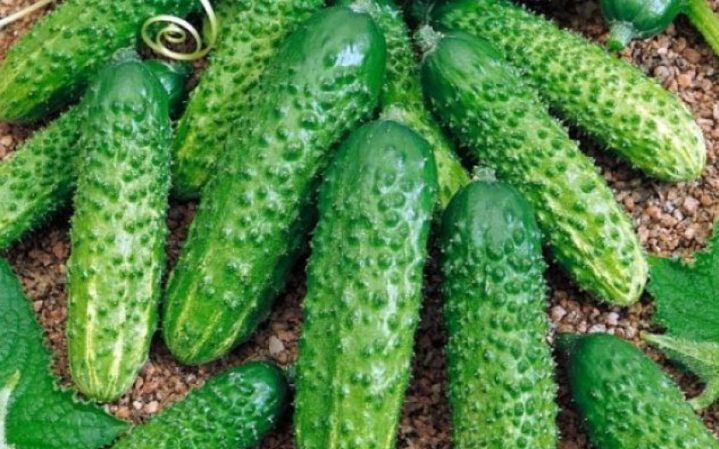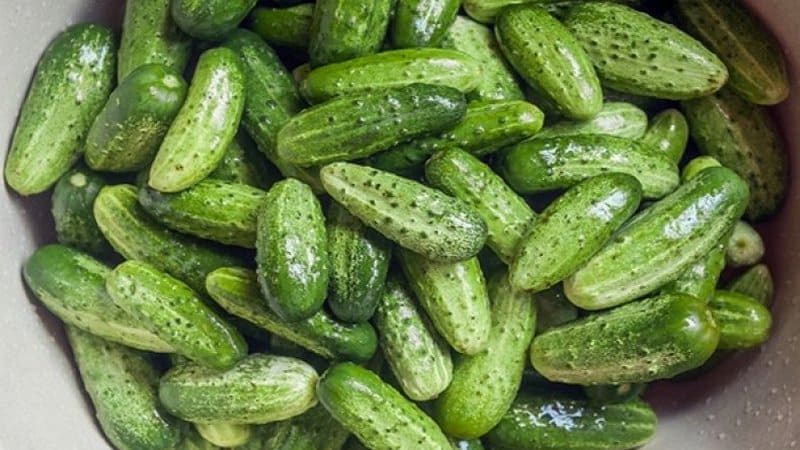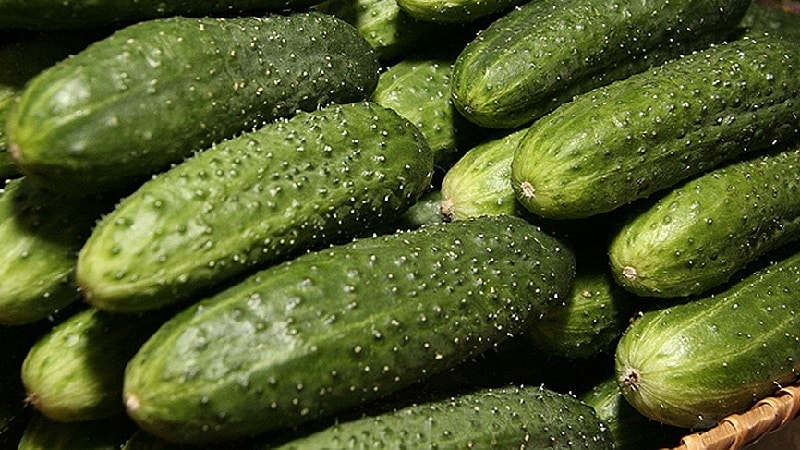A selection of the best varieties of cucumbers for open ground in the Moscow region and tips for choosing them
In 2018, Russia ranked 4th in the world in terms of the number of cucumbers grown. Almost any domestic gardener devotes part of the plot to planting this vegetable crop. The plant is easy to care for and produces a quick harvest.
Let's consider the best varieties of cucumbers for open ground in the Moscow region.
Variety selection
Cucumbers require average light, humidity, and no sudden temperature changes. The moderate continental summer of the Moscow region meets these criteria. Plants are planted in the ground no earlier than May, since they do not tolerate frost. The first fruits ripen already at the beginning of summer, and the harvest is completed before the onset of cold weather.

The best varieties and hybrids
The most reasonable choice for planting would be varieties and hybrids of cucumbers that quickly produce a large harvest and bear fruit for a long time.
Hector
Early maturing hybrid, bred by Dutch breeders. Ripens quickly: about 30 days after transplanting seedlings into the ground. Yields up to 5-6 kg of vegetables per 1 m2. The fruits are small, about 10 cm in length, cylindrical in shape. The taste is rich herbaceous, the flesh is juicy.
The hybrid is resistant to ascochyta blight, bacteriosis, powdery mildew, aphid and whitefly attacks, and bad weather.
The disadvantages of Hector include a short period of fruiting: only the first 3 weeks.
Darling
Golubchik is a mid-early hybrid with a yield of 1.2–2.8 kg/m2. The fruits grow spindle-shaped, covered with large tubercles.Crispy vegetables are universal: they are recommended for consumption both fresh and canned.
The crop is bee-pollinated - it is planted in places where a sufficient number of bees fly. Water the bed regularly: when there is a lack of moisture, the flowering rate decreases.
The fruits are well transported, stored, and have high commercial properties.
Reference! A hybrid is the result of artificial selection carried out by crossing two varieties, having the best characteristics of both parents. The seed material of hybrids is not suitable for planting, as it does not retain the necessary properties of the crop.
The plant is resistant to cucumber mosaic virus, downy mildew and powdery mildew.
April
The hybrid is early ripening: the first fruits ripen 45–50 days after emergence. Fruiting is long and abundant, the yield in the first month is 7–13 kg/m2, and in total about 25 kg of cucumbers grow in a season.
The hybrid is parthenocarpic - it does not require pollination, but its presence increases productivity by 30%.
The fruits are shade-tolerant and relatively cold-resistant, resistant to cladosporiosis (olive blotch), and indifferent to root rot.
Alex
Early maturing self-pollinating hybrid of Dutch origin. Productivity - 2.8–5.7 kg/m2. The plant produces short-fruited gherkins without bitterness, which are well suited for whole preservation.
The crop bears fruit until October – November. Loamy and breathable soils are preferred for cultivation.
Bushes need to be periodically formed by removing stepsons.
Important! Refusal to pintle leads to the fact that the lateral shoots take away nutrition from the main stem, as a result, the number of female inflorescences decreases and the yield falls.Timely removal of excess shoots contributes to an earlier and more abundant harvest.
Plants are resistant to cucumber mosaic virus, powdery mildew and olive spot.
Aquarius
The Aquarius variety was bred in Russia in 1984 using the cross-pollination method. It is advisable to plant the crop on the eastern or western side of the site: the plants do not like northern winds.
Fruiting period - from July to August. Productivity is 8–12 kg/m2. The fruits are elongated-oval, 12–14 cm long, the surface is covered with tubercles, smooth at the base. Upon reaching biological maturity, vegetables acquire a rich taste without bitterness and acid, and retain gastronomic characteristics for a long time.
Masha
Hybrid seeds Masha cannot be soaked before planting, as they are treated with a pesticide composition that protects against the formation of fungal spores.
Cucumbers ripen quickly: approximately 35 days from the moment of first shoots. Productivity is high: 10-11 kg per 1 m2. Small dark green cylindrical gherkins with large tubercles and white fluff grow.
Advice! During the fruiting period, ripe vegetables are removed from the bushes daily to stimulate the growth of new ovaries.
Plants form shoots to a limited extent and are resistant to cladosporiosis, cucumber mosaic virus and powdery mildew.
Angelina
This hybrid of Dutch selection is planted at the end of April, and the first harvest is harvested in July. The crop yields up to 122–220 c/ha.
Before sowing, the soil is treated with mineral or organic fertilizers. Angelina grows in bushes of medium height, 3 cucumbers up to 12 cm in size are formed in one bunch. Plants are resistant to cold, insufficient lighting, cladosporiosis, and bacteriosis.
Vir 505
This is one of the favorites of summer residents in the Moscow region, as it can withstand temperature fluctuations.
Vir 505 is an early ripening self-pollinating hybrid: 32–38 days pass from germination to the first harvest. Marketable yield - 3 kg/m2. Vegetables are large-tuberous, elongated-ovoid in shape. The pulp is juicy, suitable for salads and pickles.
Bush
The variety does not grow into thickets, but forms small compact bushes that do not take up much space and are convenient for small areas. Plants do not require constant shaping and pruning of shoots.
Bush trees are planted from mid-May to mid-June. The culture is not frost-resistant, so the soil temperature should not fall below +8°C. The variety is bee-pollinated and is capable of producing new seeds for subsequent cultivation.
Productivity - 5-6 kg/m2. Short-fruited vegetables are suitable for processing or eating fresh.
State Farm
Cucumbers of this hybrid have a dense structure and do not break when harvested by machine, so farm owners value the crop.
The fruits ripen within 45–50 days. The shape of the vegetables is oval-cylindrical, length - 8–11 cm, the pulp is juicy with small seeds, the peel is without bitterness. Productivity - up to 6 kg/m2.
The hybrid is resistant to angular spot and tobacco mosaic - the most common diseases of cucumbers in the Moscow region.
How to choose a variety
Since summer in the Moscow region is unpredictable, when planning to grow cucumbers on a plot, they are guided by the characteristics of the variety:
- ripening time;
- duration of fruiting;
- type of pollination;
- fruit size.

Early ripening
Such plants give the first harvest 38–45 days from the moment the seedlings are planted in open ground. Early ripening varieties and hybrids (for example, Angelina, Vir 505, Masha) are popular among gardeners in the Moscow region due to the short summer season.
Mid-season
These plants bear fruit 46–55 days after planting, have greater immunity to various diseases and pests, but do not tolerate temperature changes and frosts. TO mid-season include April, Golubchik, Nezhinsky, Competitor.
Late ripening
Late varieties and hybrids ripen for more than 56 days and are designed for harvesting and storing crops for the winter. These are the most frost-resistant crops; they are often frozen for future use. Popular among representatives Phoenix, Winner, Sapphire.
Short-fruited
Cucumbers whose length does not exceed 12 cm are called short-fruited. Summer residents prefer these small, even vegetables due to their high yield, excellent taste and ease of canning. Options: Rhythm, Millionaire, Aramis, Commander.
With a long fruiting period

In varieties and hybrids that tend to form lateral layers, a new one grows in place of each removed fruit, and this happens several times a season. The more fruiting cycles, the higher the value of the crop, especially if the vegetables are sold. Popular among varieties mother-in-law, Ajax, Heroic power, Piccolo.
Attention! The fruiting period depends not only on the variety, but also on a number of other factors: timely watering, sufficient sunlight, fertilizing, proper garter of the bush.
Self-pollinating
It is difficult to breed natural plant pollinators - bees and bumblebees - in a summer cottage, so most gardeners choose self-pollinating or parthenocarpic crops. Examples: April, Emelya, Zozulya, Courage.
Reviews
Gardeners in the Moscow region who have already tried cucumber seeds for open ground share their impressions.
Alevtina, Istra: “Through trial and error, I selected several types of cucumbers for myself, which I now plant every year: Vir 505, Masha and Golubchik. The last one is my favorite. In May, before planting, I first soak the seeds, then plant them in open ground, without a greenhouse. The crop is easy to care for: there is no need to build trellises or additional equipment - just regular watering and fertilizing. The fruits ripen about 40 days after planting, we eat them fresh and can them. Vegetables do not soften in brine and retain their crispness and elasticity.”
Nikolay, Volokolamsk district: “I really like to plant cucumbers in my summer cottage. I often experiment and try different options. The last time the choice fell on Angelina’s seeds: she was captivated by the promised yield. The seeds are not cheap - 50 rubles per package. The plant turned out to be unpretentious in planting and care. The smell and taste of fresh home-grown cucumber is difficult to put into words! The seeds lived up to expectations.”
Sasha, Vidnoye: “When I was first advised to use Hector seeds, I was skeptical: I don’t trust Dutch hybrids. I decided to try it because of self-pollination: there are fewer and fewer bees on the site every year. The vegetables were planted and sprouted, and then fruits. I was pleased with the small size of the cucumbers. The bushes on which they grow turned out neat and compact, they do not require shaping, and the vegetables are easy to collect. The yield is average, but I like the sweetish taste of the gherkins. Next year I plan to plant this crop again.”
Conclusion
There are dozens of varieties and hybrids of cucumbers suitable for the climate of the Moscow region.To determine the optimal crop, it is worth trying different options over one or more seasons. For the climate near Moscow, early and mid-season varieties and hybrids are suitable, which bear fruit for a long time, do not require pollination and produce small cucumbers.